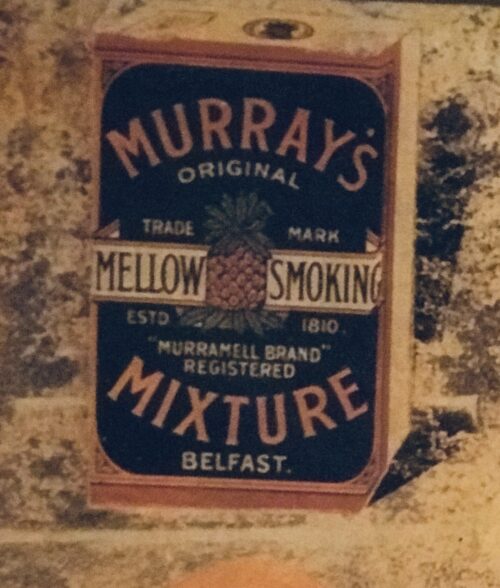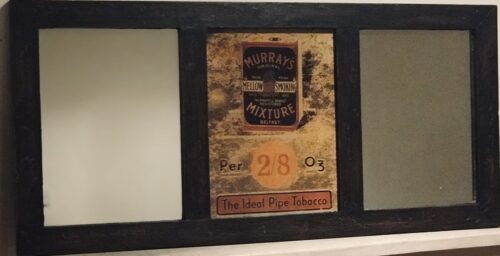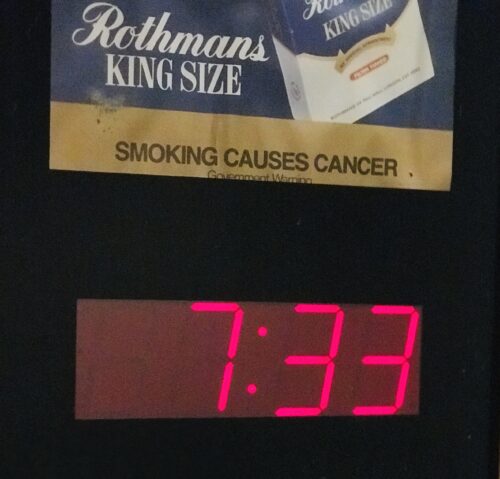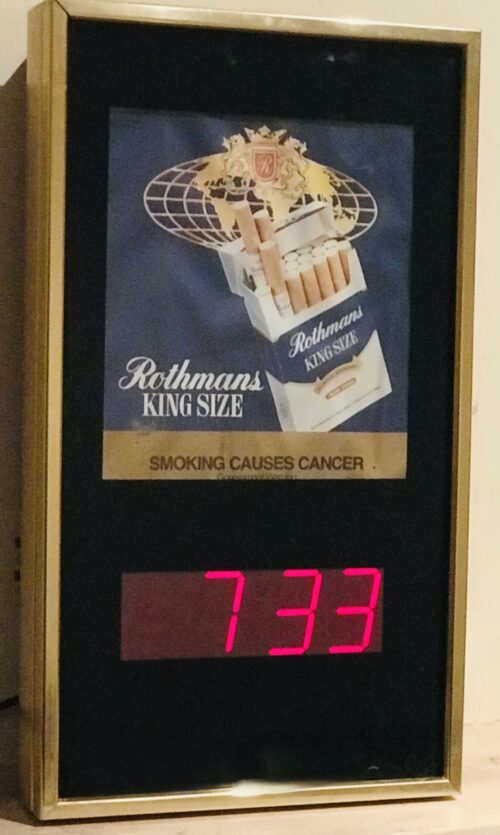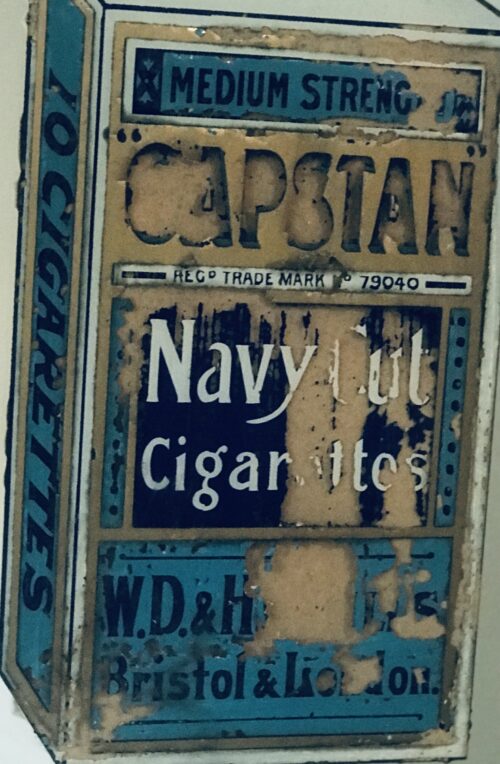Really cool Capstan Navy Cut Vintage Mirror .
Dublin. 62cm x 46cm
W.D. & H.O. Wills was a
British tobacco importer and manufacturer formed in
Bristol,
England. It was the first UK company to mass-produce
cigarettes. It was one of the founding companies of
Imperial Tobacco along with
John Player & Sons.
The company was founded in 1786 and went by various names before 1830 when it became W.D. & H.O. Wills. Tobacco was processed and sold under several brand names, some of which were still used by Imperial Tobacco until the second half of the 20th century. The company pioneered the use of
cigarette cards within their packaging. Many of the buildings in Bristol and other cities around the United Kingdom still exist with several being converted to residential use.
Henry Overton Wills I arrived in Bristol in 1786 from
Salisbury, and opened a tobacco shop on Castle Street with his partner Samuel Watkins. They named their firm Wills, Watkins & Co.
When Watkins retired in 1789, the firm became
Wills & Co. Next, the company was known from 1791 to 1793 as
Lilly, Wills & Co, when it merged with the firm of Peter Lilly, who owned a snuff mill on the
Land Yeo at
Barrow Gurney. The company then was known from 1793 up until Lilly's' retirement in 1803 as
Lilly and Wills.
In 1826 H.O. Wills's sons
William Day Wills and
Henry Overton Wills II took over the company, which in 1830 became W.D. & H.O. Wills. William Day Wills' middle name is from his mother Anne Day of Bristol. Both W.D. and H.O. Wills were non-smokers.
When William Day Wills was killed in 1865 in a carriage accident, 2000 people attended his funeral at
Arnos Vale Cemetery.
During the 1860s a new factory was built to replace the original Redcliffe Street premises, but they quickly outgrew this. The East Street factory of W.D. & H.O. Wills in
Bedminster opened in 1886 with a high tea for the 900 employees in the Cigar Room.
The new factory was expected to meet their needs for the remainder of the century, but within a decade it was doubled in size and early in the 1900s a further Bristol factory was created in Raleigh Road, Southville.
This growth was largely due to the success of cigarettes. Their first brand was "
Bristol", made at the
London factory from 1871 to 1974.
Three Castles and
Gold Flake followed in 1878 but the greatest success was the machine-made
Woodbine ten years later.
Embassy was introduced in 1914 and relaunched in 1962 with
coupons. Other popular brands included
Capstan and
Passing Clouds. The company also made cigar brands like
Castella and
Whiffs, several pipe tobacco brands and
Golden Virginia hand-rolling tobacco.
Up until 1920 only women and girls were employed as cigar-makers. One clause in the women's contract stipulated:
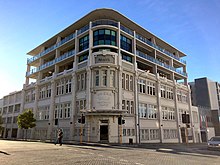
The former W.D. & H.O. warehouse building in
Perth, Western Australia
In 1898
Henry Herbert Wills visited Australia which led to the establishment of
W.D. & H.O. Wills (Australia) Ltd. in 1900.
When
Princess Elizabeth visited on 3 March 1950 she was given cigarette cards as a gift for
Prince Charles.
In 1901 thirteen British tobacco companies discussed the
American Tobacco Company building a factory in the UK to bypass taxes. The
Imperial Tobacco Company was incorporated on 10 December 1901 with seven of the directors being members of the Wills family.
Imperial remains one of the world's largest tobacco companies.
The last member of the Wills family to serve the company was Christopher, the great great grandson of H.O. Wills I. He retired as sales research manager in 1969.
The company had factories and offices not only in Bristol, but also in
Swindon,
Dublin,
Newcastle and
Glasgow. The largest cigarette factory in
Europe was opened at
Hartcliffe Bristol, and was designed by
Skidmore, Owings & Merrill in 1974, but closed in 1990. It proved impossible to find a new use for it and it was demolished in 1999; its site is now the Imperial Park retail complex, but the associated offices became
Lakeshore, residential apartments created by
Urban Splash.
The facade of the large factory in Bedminster and bonded warehouses at Cumberland Basin remain prominent buildings in Bristol, although much of the existing land and buildings have been converted to other uses, such as The
Tobacco Factory Theatre.
The Newcastle factory closed in 1986 and stood derelict for over a decade, before the front of the
Art Deco building – which was preserved by being
Grade II listed – reopened as a block of luxury apartments in 1998. (See main article:
Wills Building) The factory in Glasgow has similarly been converted into offices.
In 1988 Imperial Tobacco withdrew the Wills brand in the United Kingdom (except for the popular
Woodbine and
Capstan Full Strength brands, which still carry the name).
The company pioneered canteens for the workers, free medical care, sports facilities and paid holidays. Wills commissioned portraits of long-serving employees, several of which are held by
Bristol Museum and Art Gallery and some of which can be seen on display at the
M Shed museum. In 1893 the W.D. & H.O. Wills Ltd Association Football Team was established and the company also held singing classes for the younger workers and women that year.
In 1899 wives of Wills employees serving in the
Boer War were granted 10 shillings per week by the factory.
Bristol Archives holds extensive records of W.D. & H.O. Wills and
Imperial Tobacco . In addition there are photographs of the Newcastle factory of W.D. & H.O. Wills at
Tyne and Wear Archives in Bristol holds the Wills Collection of Tobacco Antiquities, consisting of advertising, marketing and packaging samples from the company's history, photographs and artefacts relating to the history of tobacco.
In 1959 the company launched the short-lived
Strand brand. This was accompanied by the iconic, but commercially disastrous,
You're never alone with a Strand television advertisement.
In India, the
Gold Flake,
Classic and
Wills Navy Cut range of cigarettes, manufactured by
ITC , formerly the
Imperial Tobacco Company of India Limited,
still has W.D. & H.O. Wills printed on the cigarettes and their packaging. These lines of cigarettes have a dominant market share.
In 1887, Wills were one of the first UK tobacco companies to include
advertising cards in their packs of cigarettes, but it was not until 1895 that they produced their first general interest set of cards ('Ships and Sailors'). Other Wills sets include 'Aviation' (1910), 'Lucky Charms' (1923), 'British Butterflies' (1927), 'Famous Golfers' (1930), 'Garden Flowers' (1933) and 'Air Raid Precautions' (1938)
Wills also released several sports sets, such as the
cricket (1901, 1908, 1909, 1910),
association football (1902, 1935, 1939),
rugby union (1902, 1929) and
Australian rules football (1905) series.
-
Charles de Trafford, 1901
-
-
-
-
-
-
New Croton Dam, NY The factory in Hartcliffe, Bristol, was the location for the filming of UK television series
Doctor Who, Episode 95 - The Sun Makers (1977). Filming at the Wills Factory spanned 13 to 15 June 1977. In addition to the roof and tunnels, scenes were also filmed in the lift and the roof vent.

